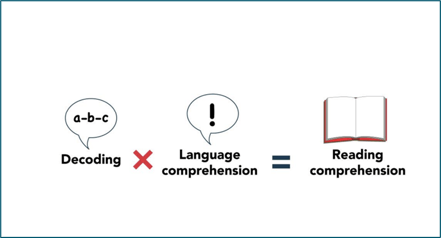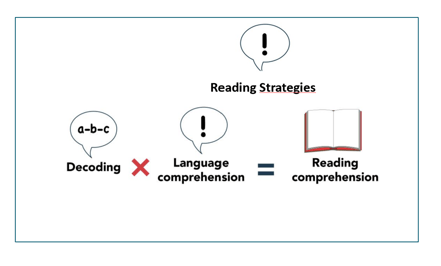Pupils need structured instruction in both decoding and language comprehension in order to develop good reading comprehension. If they know how approach different kinds of texts, they will be more likely to benefit from and find use for their reading
The Simple View of Reading
Lexplore is based on The Simple View of Reading, which is an established model for reading development.
The model describes that students need to be able to decode text and have linguistic understanding in order to develop good reading comprehension.

Lexplore also chooses to add reading strategies as an important parameter for dealing with different texts.

Decoding & Reading Fluency
Lexplore provides a method for working with decoding and reading fluency.
The technical part of reading must work in order for the student to be able to assimilate the content and understand the text they are reading.
This is most evident for students who have not mastered decoding and adequate reading fluency. Even for the stronger students, structured training of reading fluency gives good results.
As the reading fluency exercises are available for all reading levels, you can carry out structured periods of training in your class. If you want to vary the exercises, you can use regular literature. The most important thing is that students read aloud!
Sometimes, pupils need extra support, in which the exercises can be done in smaller groups or possibility even one-on-one with an adult.
Whatever the specific arrangement, the method is based on Phonics, which can be translated as structured grapheme-phoneme coupling (Ehri, C.L et. Al. 2001).
Sometimes students may need an extra boost and then the exercises are just as suitable to be carried out in small groups or perhaps individually with an adult.
Language comprehension
Lexplore offers exercises and lessons to develop language skills.
In short, language comprehension means
-
a good vocabulary
-
perception of the structure of language
-
the learner's experience of the spoken language
-
As a Lexplore customer, you can find all the lessons and exercises through the Teaching page of the portal.
The best-case scenario is when you and your colleagues can plan quality reading instruction together at your school and supplement it with Lexplore’s material.
In Lexplore's exercises and lessons, students have the opportunity to develop different reading strategies with the teacher in order to be able to tackle different reading strategies.
In short, reading strategies mean
- Predicting and hypothesising
- Asking questions
- Clarifying ambiguities
- Summarising
- visualising
When students start practising the reading strategies, it may be useful to use different characters that help them understand the strategies.
There are lessons and exercises for both fiction and non-fiction reading.
As a Lexplore customer, you can download strategy cards via the Reading Education page in the portal.
📖More reads on the topic
- About the research behind Lexplore’s recommendations and material: Methods for Reading Development
- Fluency Practice
🛎️Here at Lexplore, we love to help our users with their questions and provide self-help guides for quicker service. Please vote below on the Question of whether or not this article was helpful. 😊
